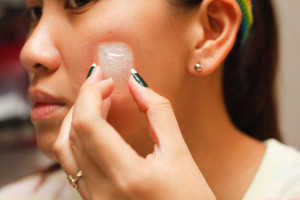 According to the Mayo Clinic the treatment for any allergy is to stay away from that which you are allergic too. However, mold is something that can be found everywhere in the environment so this is quite difficult to control. You must start with getting rid of any mold you find in your home. You can be treated with medication, but try to get rid of the source so that you can make your environment as healthy as possible. You will need to bleach clean your house to remove the mold, but if the mold reappears which often happens you need to bring in a professional to get the job done.
According to the Mayo Clinic the treatment for any allergy is to stay away from that which you are allergic too. However, mold is something that can be found everywhere in the environment so this is quite difficult to control. You must start with getting rid of any mold you find in your home. You can be treated with medication, but try to get rid of the source so that you can make your environment as healthy as possible. You will need to bleach clean your house to remove the mold, but if the mold reappears which often happens you need to bring in a professional to get the job done.
Now for the allergy treatments for mold
Mold allergy medication will depend upon how mild or severe your allergies are and your best bet is to go see your doctor or an allergy specialist to determine that for you. The doctor will work with you to find the best treatment plan. The allergist may also give you allergy shots to build up your resistance to the mold spores. Your doctor may prescribe a nasal lavage, which simply means to rinse your nose with a saline solution. You can buy a saline spray or you can make your own spray by using two cups of warm water mixed with a teaspoon of salt.
 The first type of treatment given is the nasal spray. They will prevent and treat the inflammation, which is associated with an upper respiratory mold allergy. It usually is the most effective treatment across the board. These medications will be fluicasone propionate (Flonase Veramyst), mometasone which is Nasonex, and beclomethasone, brand name Beconase. There is also Nasoquort for your runny nose.
The first type of treatment given is the nasal spray. They will prevent and treat the inflammation, which is associated with an upper respiratory mold allergy. It usually is the most effective treatment across the board. These medications will be fluicasone propionate (Flonase Veramyst), mometasone which is Nasonex, and beclomethasone, brand name Beconase. There is also Nasoquort for your runny nose.
If you have itching, sneezing and a runny nose then antihistamines, which will combat the histamine that your body is producing in order to fight off the mold spores during your allergic reaction can be used. There are over the counter antihistamine medications. These include loratadine, which is sold as Claritin, and Alavert, and certrizine sold as Zyrtec. There are some older medications still effective medications on the market such as diphenhydramine sold under the brand name Benadryl and clemastine sold as Tavist. These medications work well but may make you sleepy.
If you need a stronger antihistamine you have to have a prescription for fexxofenadine, which is Allegra, or the nasal spray azelastine, which is Astelin. You may want to try some decongestants if you find you are too congested. They come in both over the counter and prescription strength. You can get them in nasal, liquid and tablet forms. If you go with the oral decongestants there are Sudafed, Drixoral and Actifed, which work well enough and if you prefer the nasal sprays there are phenylephrine, which is Neo-Synephrine, and oxymetazoline, which is Afrin.
 You have to be careful though, if you have high blood pressure you want to stay away from oral decongestants. Also, you should not use a nasal decongestant more than three times a day at a time because it can cause rebound congestion and you will remain stuffed up.
You have to be careful though, if you have high blood pressure you want to stay away from oral decongestants. Also, you should not use a nasal decongestant more than three times a day at a time because it can cause rebound congestion and you will remain stuffed up.
There is a medication available over the counter called NasalCrom which contains Cromolyn sodium. It is designed to prevent the release of histamines to relieve your mold allergy symptoms. It is a nasal spray and should be taken three times a day and works well before your symptoms develop.
Montelukast, better known as Singulair is a prescription tablet that will block the leukotrienes which is an immune system chemical that causes the allergy symptoms, such as excessive mucous. Asthma sufferers also use this medication. Singulair is not as good as inhaled corticosteroids, but it is most often used when a person cannot tolerate nasal sprays.
Related Posts
Related Articles
